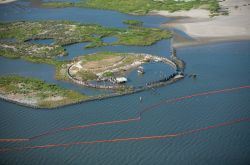 The pressure continues to mount as BP attempts to ebb the flow of oil in the Gulf of Mexico. As of today, oil has reached Florida and now four states have been affected: Louisiana, Alabama, Florida and Mississippi. BP has responded in part by offering $70 million to the four states to help promote tourism – an effort to offset the loss of dollars in other industries. One of the industries most affected is the fishing industry that has been all but shut down. And while fisherman are out of work, seafood prices have already risen more than 20 percent. But, don’t worry, according to Tony Hayward, BP Group Chief Executive, in the overall scheme of things, this oil spill isn’t that bad. Interesting since most are predicting that this will be the worst oil spill in US history.
The pressure continues to mount as BP attempts to ebb the flow of oil in the Gulf of Mexico. As of today, oil has reached Florida and now four states have been affected: Louisiana, Alabama, Florida and Mississippi. BP has responded in part by offering $70 million to the four states to help promote tourism – an effort to offset the loss of dollars in other industries. One of the industries most affected is the fishing industry that has been all but shut down. And while fisherman are out of work, seafood prices have already risen more than 20 percent. But, don’t worry, according to Tony Hayward, BP Group Chief Executive, in the overall scheme of things, this oil spill isn’t that bad. Interesting since most are predicting that this will be the worst oil spill in US history.
So, who exactly isn’t this oil spill bad for? Marine life? The fishing industry? Consumers? It appears that the only organization it’s not so bad for is BP who makes $93 million in profits every day.
I keep seeing this obscene number, $93 million everywhere and it led me to ask the question, what would you do with 3.8 days of BP’s profits, or $300 million to develop our country’s alternative energy program? I used this number because this is how much money BP had spent on clean-up efforts one week after the spill – less than 4 days of their profits. I reached out to nearly a dozen associations asking them the question but only a few responded. Here are a few of respondents answers.
“Many people have asked me what I’d do with the same amount of money BP will have to spend to clean up this mess. My answer is quite simple: Invest in Algae technologies. Algae for wastewater treatment, Algae for CO2 capture, Algae for Pharmaceuticals, Algae for high grade animal feed for livestock, Algae for fertilizer, Algae for biobased polymers, and finally: Algae technologies to produce an entire suite of advanced biofuels. The time has come to enact a serious and aggressive energy policy that will not only free us from our addiction to oil but will provide us with a new and long term prosperity for decades to come.” –Sean O’Hanlon, Executive Director, American Biofuels Council
“A 2009 study by Sandia National Laboratory, ‘The 90-Billion Gallon Biofuel Deployment Study,’ shows that the capital investment needed for biorefinery construction and biofuel infrastructure to meet 30 percent of our transportation fuel needs is around $250 billion. However, that amount is “actually of similar magnitude to petroleum-related investments required to establish and maintain 40 billion gallons per year of domestic oil production,” according to the study. $350 million could fund construction of one or two commercial-scale advanced biofuel biorefineries. This may sound like a large investment for little return, but those first plants could assure institutional investors and commercial lenders that putting their money behind new advanced biofuel technology is worth the risk.” –Brent Erickson, executive vice president of the Biotechnology Industry Organization’s Industrial & Environmental Section
Erickson also noted that in 2007 BP announced a $500 million investment over 10 years to create the Energy Biosciences Institute for research into advanced biofuel technology. He stressed that additional investments in advanced biofuel deployment are now needed to move the industry forward.
Lastly a comment from Twitter (you can follow me here):
 “I would invest in building efficient infrastructure/logistics to get energy to the masses. All liquid forms of energy used in vehicles need to get to the consumer. Right now oil based fuel has infrastructure to get energy to consumer (massive pipeline systems feeding subsystems feeding gas stations). Biofuel needs similar infrastructure. Pipeline system also need improvements.” John Blue, Truffle Media Networks
“I would invest in building efficient infrastructure/logistics to get energy to the masses. All liquid forms of energy used in vehicles need to get to the consumer. Right now oil based fuel has infrastructure to get energy to consumer (massive pipeline systems feeding subsystems feeding gas stations). Biofuel needs similar infrastructure. Pipeline system also need improvements.” John Blue, Truffle Media Networks
While can we can debate how to develop a biofuels program, what we can’t debate is that consumers are frustrated with Big Oil and we must reduce our consumption. Sean O’Hanlon noted, “We can debate the degree to which various alternatives offer the greatest return on investment (ROI), both environmentally and economically; we can engage in intelligent conversation over which alternatives offer the best solutions; and we can consider the challenges each alternative may impose as they become more mainstream. However, we cannot deny the irrefutable damage that petroleum has caused, is causing, and will continue to cause so long as we remain addicted.”
O’Hanlon is right on target, and now is the time to work together for change. The biofuels industry needs to work together. Big Oil needs to work with biofuels industry. And Big Oil needs to manifest change from within. Let’s keep the conversation active. Submit your comments and insights to this site or contact me directly.

